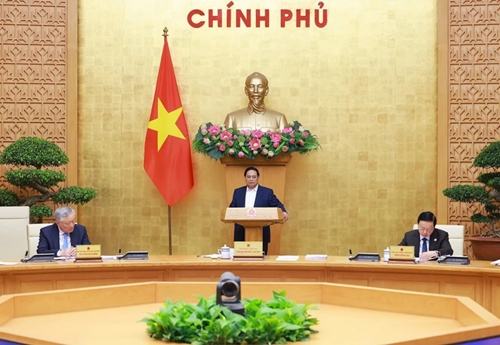Prime Minister Pham Minh Chinh noted that the world experienced complicated and unpredictable changes in May, including trade tension, armed conflicts and non-traditional security threats, impacting the global economy, especially major markets and supply chains.
Domestically, Vietnam focused on restructuring the political system’s organizational apparatus, establishing the two-level local administration model, rolling out drastic measures to secure at least 8% growth for this year and respond to the U.S.' new tariff policy, implementing the Politburo's four key resolutions, preparing for the National Assembly’s ninth session, and organizing celebration of major anniversaries, he said.
    |
 |
|
Prime Minister Pham Minh Chinh addresses the meeting. |
In this context, the country still recorded positive socio-economic results, with the macro-economy stable, inflation controlled, and key economic balances ensured. Notably, on June 2, electricity consumption reached an all-time high while supply was still guaranteed. Budget overspending and public debt were kept under control; growth bolstered; and agriculture, industry, and services sectors all showed positive development, the Prime Minister said.
Attention has been given to cultural and social affairs, with social security ensured. The National Assembly and Government have passed resolutions on social housing development to address housing difficulties for disadvantaged families while the program to eliminate temporary and dilapidated housing is nearing completion. Material and spiritual lives of people improved; political and social stability were maintained; national defense, security, and social order were strengthened; diplomacy intensified; and long-stalled projects involving around USD 240 billion and over 200,000 hectares of land are being actively resolved, he noted.
However, Prime Minister Pham Minh Chinh also highlighted ongoing challenges, including the big macroeconomic management pressure, difficulties facing production and business activities, a slow real estate market, complex gold market issues, smuggling and counterfeit goods, and food safety concerns. He pointed out the need to boost exports, especially to large, traditional, and new markets, as well as shipments of new products like halal foods. Meanwhile, administrative procedures remain cumbersome, and there are still numerous challenges such as drug crime and cybersecurity threats to social order and safety.
He asked ministries, sectors and agencies to analyze the socio-economic situation in May and the five-month period, set tasks for June and the rest of the year, and propose solutions.
At the meeting, the Ministry of Finance reported that socio-economic conditions in May and the first five months continued to improve, outperforming previous months and the same period last year.
Macro-economic stability remained solid, and inflation was controlled. The consumer price index (CPI) increased 3.21% over five months’ year-on-year. The monetary market was basically stable, and lending interest rates continued to fall, especially short-term rates. State budget revenue reached nearly 58% of this year's target, up 24.5% year-on-year while budget spending rose 27.7%, with strict savings on regular expenditures to meet economic-social development, defense, security, debt repayments, and policy commitments.
Trade figures surged in May compared to last year, with exports up 14% and a trade surplus estimated at USD 4.67 billion. Public investment disbursement accelerated significantly, reaching an estimated VND 199.3 trillion (USD 7.64 billion), equivalent to 24.13% of the Prime Minister’s plan. That was 2.5% or VND 56 trillion higher than the same period last year.
Key economic sectors sustained growth momentum. The index of industrial production (IIP) rose 8.8% during the five months. Retail sales and consumer service revenue went up 9.7% between January-May. The Purchasing Managers’ Index (PMI) in May stood at 49.8 points. Tourism also grew, with over 9.2 million international visitors in five months, up 21.3% from a year earlier. Foreign direct investment (FDI) attraction remained a bright spot, with registered FDI hitting USD 18.4 billion, a 51.1% increase, and disbursed FDI about USD 8.9 billion, up 7.9% year-on-year.
Source: VNA